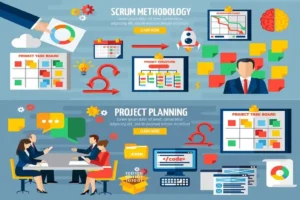Designing a Powerful Talent Management Strategy for the Digital Era
Key Takeaways
- The integration of technology is vital for modern talent management.
- Employee engagement is central to retaining top talent.
- Continuous learning opportunities drive employee development and satisfaction.
Introduction to Talent Management
In the swiftly evolving digital landscape, organizations face the dual challenge of remaining relevant while progressing toward sustained growth. A potent tool in fulfilling this need is a comprehensive approach to talent management. Talent management, in its essence, goes beyond simply acquiring skilled professionals; it encompasses nurturing a dynamic environment where employees are inspired, motivated, and valued. The importance of talent management can be seen in its capacity to empower employees, paving the way for innovation and productivity at every level. By strategically investing in technology and human capital, businesses can redefine how they harness talent, turning potential into a powerful driver of organizational success.
The Role of Technology in Modern Talent Management
Technology has transformed every facet of talent management, ushering in a new era of possibilities. Tools such as artificial intelligence (AI) and machine learning are not merely modern conveniences but game-changers in the recruitment and development sectors. These technologies empower HR professionals to extract insights from vast datasets, streamlining the process of identifying and nurturing top talent. AI-driven analytics can forecast employee success and tailor development programs to individual needs, ensuring a personalized approach to employee growth. Furthermore, integrating these innovative solutions enables organizations to maintain agility, remain competitive, and anticipate industry shifts, ensuring they are equipped for the demands of tomorrow.
Engaging Employees in the Workplace
Employee engagement is vital, forming the bedrock of an organization’s success and sustainability. Engagement reflects employees’ enthusiasm and commitment toward their roles, directly impacting productivity, innovation, and job satisfaction. Companies with high employee engagement often experience lower turnover rates, as engaged employees demonstrate loyalty and dedication to their work. Strategies to boost engagement must create an inclusive and supportive work environment where recognition, career advancement, and effective communication reign supreme. Organizations can foster a culture of excellence and drive sustainable growth by making employees feel valued and heard.
Developing a Culture of Continuous Learning
Continual change will define the future, and a culture of continual learning and development is necessary to adapt to this evolution. Businesses that invest in ongoing education enable their employees to keep on top of developments in the field and technology. This investment increases job satisfaction by strengthening the organization’s skill set and coordinating individual development with corporate goals. Because they understand that continuous learning improves job chances and personal development, employees are increasingly looking for companies that provide possibilities for skill development. Adopting this strategy promotes a culture of creativity, flexibility, and fortitude—essential qualities in the current competitive environment.
Adapting to Remote and Hybrid Work Environments
The rise of remote and hybrid work models has led to a transformative shift in how organizations approach talent management. This new paradigm requires rethinking strategies to maintain productivity, engagement, and satisfaction across diverse work settings. To thrive in this environment, organizations must leverage digital collaboration tools and create inclusive policies that ensure all employees have access to support and opportunities. Flexibility and trust become critical, as employees who feel trusted and supported are likelier to exhibit high engagement and contribute positively to team dynamics. Adopting a mindset that embraces the fluidity of remote work can result in increased productivity and satisfaction, ultimately leading to lower attrition rates and a stronger organizational culture.
Measuring Success in Talent Management
Assessing talent management’s success involves a comprehensive appraisal of various metrics, ensuring alignment with broader business objectives. This appraisal encompasses employee satisfaction surveys, retention rates, and performance indicators, each providing crucial insights into the efficacy of current strategies. Feedback loops and regular evaluations help organizations fine-tune their approaches, making necessary adjustments to enhance employee experiences and address emerging challenges. By embedding data-driven insights into their talent management frameworks, companies can continually adapt and optimize their practices, achieving strategic goals and positioning themselves for long-term success.
Future Trends in Talent Management
Due to changing labor expectations and technology breakthroughs, the dynamic field of talent management is set to undergo additional change. According to future trends, there will be a greater focus on individualized employee experiences, with HR strategies tailored to each worker’s goals and employees’ needs. Big data will improve these tactics, allowing for more precise resource allocation and predicting choices. Companies that stay ahead of these trends will be better able to draw in and keep top people by offering a rewarding workplace that accommodates both present and future demands. Organizations can prosper in a business ecosystem that is changing quickly by adopting such innovations.
Conclusion
The journey toward effective talent management in the digital age involves integrating innovative technological advancements with a robust framework prioritizing employee engagement, continuous learning, and adaptability. By focusing on these key pillars, organizations can unlock the full potential of their workforce, transforming challenges into strategic opportunities for growth and innovation. As businesses navigate the complexities of the modern world, a proactive and comprehensive talent management strategy is indispensable, ensuring they are well-prepared to capitalize on opportunities and secure competitive advantage. By committing to these principles, companies can cultivate an empowered, agile, and motivated workforce, ready to face the future with vigor and resilience.











